 |
|
 |
| AUTO MANIA:
by Dr. Iain Corness |
|
|
|

The all-new Vigo?
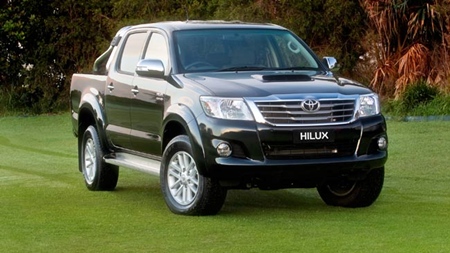
All-new(?) Vigo.
Toyota is telling us that the all-new Vigo is on its way,
but really, there’s not that much “new” about Thailand’s favorite workhorse
as far as I can see.
There is a new front bumper, revised guard flare styling
and a new bonnet with central air scoop, as opposed to the previous
off-center one. The new grille has three horizontal bars plus wrap-around
headlights.
There are some detail changes in the interior, and other
minor changes with the rear tail lights.
Toyota are also promising a greater choice of entry-level
Vigo models for export in September while all four-wheel drive models will
have an uprated towing capacity of 2.5 tonnes.
Overseas, as well as locally, the sales were down this
year. Two-wheel drives were down 21 percent in Australia, and the four-wheel
drives down 8.6 percent on last year’s figures. The overall two-wheel drive
market has fallen in 2011, down 12.7 percent to the end of June. One factor
was Toyota’s production line in Thailand was affected by the Japanese
earthquake disrupting some suppliers.
However, in 2011 there is more competition for pick-up
buyers. Nissan’s Navara and Mitsubishi’s Triton are newer in design, and the
about to be released Ford Ranger and Mazda’s all-new, BT-50s have people
waiting.
Australians get an even wider choice than we do in
Thailand (and this is supposed to be the pick-up center for the world).
There are cheaper rivals such as the Chinese Great Wall’s V240 and the new
Volkswagen Amarok at the high end of the segment.
However, despite some downward market trends, the HiLux
Vigo is still Australia’s best-selling pick-up, best-selling four-wheel
drive and most popular commercial vehicle; helped in part by company and
government fleets.
In Thailand there is also strong competition from Isuzu
and Chevrolet, so the next six months should see some strong marketing in
this market sector.
|
|
 |
Audi urban concept car breaks new ground for the brand
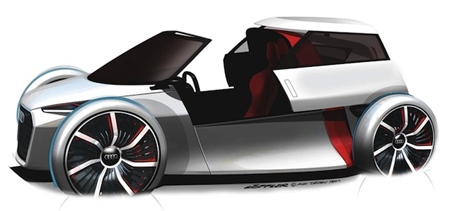
Audi’s city car.
Audi is once again exploring new horizons with the Audi
urban concept, a 1+1 seat, ultra-light car for congested urban spaces, and
that just about describes all the major cities in Thailand.
The technical study confounds conventional car categories
- the Audi urban concept combines elements of a racing car, a roadster, a
fun car and an urban car into one radical new concept. And what is more, it
is all-electric.
The Audi urban concept car is not descended from any
previous model - its development is based on the strict principles of
lightweight construction, efficiency and reduction. The result is a concept
car with no unnecessary weight, and one that concentrates on the pure
essence of dynamic motion.
The new concept has a sleek body. The wheels are
free-standing, and the surrounding protective plates feature blinking strips
of LED lights. The highly-concentrated look of the technical study, with its
forward-urging lines, is dynamic and emotional, and lends a completely new
impetus to the Audi design language.
There is room for two people on board, their position
slightly staggered and they are seated at a sporty, low level. All controls
and materials are subject to the dictates of ultra-lightweight construction
to ensure they convey a unique, sensory allure. The driver can adjust the
steering wheel and pedals for his or her own driving position. Entry to the
car is through the tailgate, while the roof is designed to be maneuverable
and slides to the rear to open. The Audi urban concept rides on 21 inch
wheels, increasing the sporty character.
The technology in the Audi urban concept reflects the
full capabilities of the brand, especially when it comes to
ultra-lightweight construction. The cockpit consists of carbon
fiber-reinforced polymer, which integrates the undercarriage of both seats,
so the occupants are held in a secure section, rather like eggs in a
container.
Two e-tron electric motors provide the propulsion -
providing the ultra-light Audi urban concept with the ability to accelerate
powerfully. A lithium-ion battery supplies the energy - ideal for extended
city tours.
|
|
 |
The right tyres in the rain
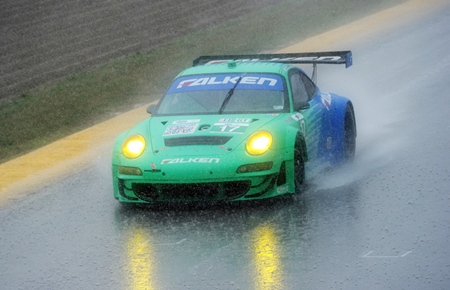
Monsoon conditions for the Falken 911.
The Falken Porsche 911 GT3 RSR achieved the first GT
class win for Porsche in the fifth race of the 2011 ALMS season. Falken
drivers Wolf Henzler and Bryan Sellers emerged victorious at the American Le
Mans Series (ALMS) by virtue of their driving skills and perfect choice of
tyres.
Wolf Henzler and Bryan Sellers are the new ALMS ‘rain
masters’ after their storming finish at the Mid Ohio round of the ALMS.
After a very mixed practice and qualifying, they kept their nerve in the
rain-drenched fifth ALMS round at the Mid-Ohio Sports Car Challenge to bring
home the first victory for Falken and Porsche in the 2011 season. “We
weren’t that happy with our practice and qualifying performance,” according
to Falken driver Bryan Sellers, “but the Falken crew worked hard to improve
the car, and we seemed to be faster the longer the race went.”
Wolf Henzler recounted the critical moments, “When it
started to rain, I still had good grip with the slicks, and didn’t want to
lose the track position. The team called me in to change, and I disagreed
with their decision. Finally, they called me in and we changed to rain
tyres. Then the racing line started to dry and I was really upset.”
Henzler’s request to go back to slicks was ignored in favor of the crew’s
strategy, “Then it rained really hard and, of course, the team was right. On
the last lap, all the guys spinning were taking the inside line, but I found
grip on the outside line and passed all those cars. Falken had tested in the
rain at Mid-Ohio, but Bryan had done all the testing. Still we had
confidence in the rain tyres and they helped us win.”
The US Team Falken Tire will take part in the next race
of the American Le Mans Series in Elkhart Lake, Wisconsin, this weekend.
|
|
 |
Round the world trip - on a Vespa?
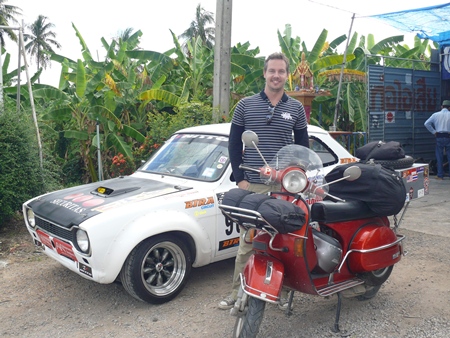
Drew Milne and the Vespa.
During the motor race meeting at Kaeng Krachan a couple
of weeks ago the Securitas Retro Escort Mk 1 broke its exhaust and we drove
to Cha Am to find a friendly little exhaust shop. The owner was thrilled to
have a racing car use his workshop and did an excellent job (and cheap too).
However, while we were there, up rolls a Vespa motor scooter, ridden by an
Aussie Drew Milne. Drew, it turned out, was a former Formula Ford champion
in South Australia, and that was why he stopped when he saw the Securitas
race Escort.
Drew is on a ride to London from Adelaide, which he
estimates will take eight months - or so! The scooter is equipped with GPS,
and has an alloy box at the back for keeping toothpaste and shaving gear.
It was great to see that the pioneering spirit hasn’t
been bred out of the young Aussies these days, and you can find Drew at
facebook.com/vescapade or drewmilne33 @gmail.com.
|
|
 |
The 8 Ball is back, bigger and blacker than ever
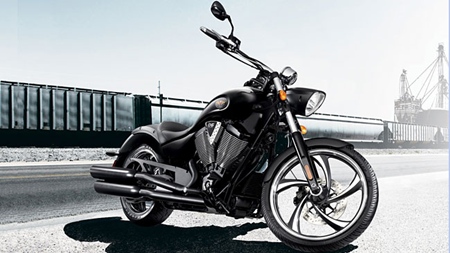
Victory Vegas 8 Ball.
Here’s something for the big bike fans. Introduced in
2009, the Victory Vegas 8 Ball and Hammer 8 Ball cruisers were an instant
hit. Black, low and minimalist, they were great value for money.
For 2011, the Vegas 8 Ball has set the bar high and the
price low. Now standard with the blacked out 72 kW/ 153 Nm 1731cc 6 Speed
Freedom V-Twin, the 8 Ball features black bars, forks, swingarm, chassis and
exhausts, the blacker the better.
But the biggest news is the price. Despite the bigger
motor and 6 speed gearbox, you get more black for less, at just US$19,995
ride-away.
The trend continues with the all new 2011 Hammer 8 Ball.
The Hammer 8 Ball joins its Hammer S stable mates with the biggest motor
Victory make. The 72 kW/153 Nm 1731cc Freedom V-Twin is now the benchmark in
American cruisers.
With the 6 speed overdrive gearbox, a fat 250 section
rear tyre, coupled with an 18 inch front wheel and inverted forks and you
have a real muscle cruiser.
It is available only in black of course with black trim.
With a waiting list already building, the line for the Hammer 8 Ball will
see you ride away at just US$24,995. Unfortunately, those are the prices in
the US - by the time you bring one out to Thailand, you can probably double
that price.
|
|
 |
GM back on top?
With the slow-down in production in the aftermath of the
tsunami/earthquake in Japan, the output from Toyota has slowed. This has
allowed GM to take the top spot for the manufacturers for the first half of
2011.
General Motors outsold Toyota globally in the first six
months to become the world’s largest automaker. GM sales rose 8.9 percent to
4.536 million units in the half-year ended June 30. That compares with 4.13
million units at second-ranked Volkswagen AG and 3.71 million units for
Toyota, whose figures include the luxury Lexus marque and affiliates
Daihatsu Motor Co. and Hino Motors Ltd.
Output at the Japan headquarters, Toyota City, slumped 23
percent to 3.37 million units in the half-year after the company halted
production following the magnitude 9 earthquake and tsunami in March.
Toyota, however, expects to enter a production recovery phase in September,
one month earlier than previously announced.
However, even if Toyota recovers production, it will take
another few more months for sales to actually recover is the prediction, and
as it takes time to deliver vehicles, Toyota’s sales may trail behind
Volkswagen in the full year as well.
GM’s U.S. sales climbed to 669,065 vehicles in the second
quarter, according to industry researcher Autodata Corp, with the Chevrolet
Cruze being the top-selling car in the market in June, and the Chevy
Silverado full-size pickup remained the second most popular vehicle, behind
Ford’s F-Series.
With the sales in China for GM also improving, with
Cadillac doing very well against Mercedes-Benz and BMW, it is likely that GM
will continue at the top into 2012.
|
|
 |
|
|
 |
|
 |

